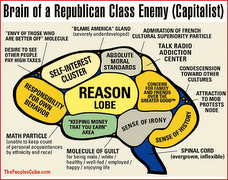In the past few months, Democrats and Republicans have drawn real, substantial battle lines over big government, for the first time in decades. To my astonishment, congressional Republicans have officially added "entitlement reform" to their agenda for the 2012 budget, ending the "third rail" protection that used to make Social Security untouchable. On the state level, courageous Republican governors have set out to break the power of the public employees' unions to loot the taxpayer.
The article below—which has also been posted at RealClearPolitics—explains on the deepest ideological level exactly what is at stake.
And it's not just domestic politics that is reaching a crucial breaking point. It is as if someone decided at the beginning of this year that it was time to change every government in the Middle East—and to do it in a couple of months! Tomorrow, I will send you a sample of my coverage of that story, particularly the uprising in Libya.
This is no ordinary time, and you cannot afford to be without a rational guide to help you understand what is going on and to arm you intellectually for the battles ahead. I hope you will consider subscribing at www.TIADaily.com/subscribe.—RWT
TIA Daily • February 23, 2011
FEATURE ARTICLE
Unionized Public Employment Is the Socialist Utopia
by Robert Tracinski
It is a matter of survival for Democrats in an immediate, practical sense. As Michael Barone explains, the government employees' unions are a mechanism for siphoning taxpayer dollars into the campaigns of Democratic politicians.
But there is something deeper here than just favor-selling and vote-buying. There is something that almost amounts to a twisted idealism in the Democrats' crusade. They are fighting, not just to preserve their special privileges, but to preserve a social ideal. Or rather, they are fighting to maintain the illusion that their ideal system is benevolent and sustainable.
Unionized public-sector employment is the distilled essence of the left's moral ideal. No one has to worry about making a profit. Generous health-care and retirement benefits are provided to everyone by the government. Comfortable pay is mandated by legislative fiat. The work rules are militantly egalitarian: pay, promotion, and job security are almost totally independent of actual job performance. And because everyone works for the government, they never have to worry that their employer will go out of business.
In short, public employment is an idealized socialist economy in miniature, including its political aspect: the grateful recipients of government largesse provide money and organizational support to re-elect the politicians who shower them with all of these benefits.
Put it all together, and you have the Democrats' version of utopia. In the larger American culture of Tea Parties, bond vigilantes, and rugged individualists, Democrats feel they are constantly on the defensive. But within the little subculture of unionized government employees, all is right with the world, and everything seems to work the way it is supposed to.
This cozy little world has been described as a system that grants special privileges to a few, which is particularly rankling in the current stagnant economy, when private sector workers acutely feel the difference. But I think this misses the point. The point is that this is how the left thinks everyone should live and work. It is their version of a model society.
Every political movement needs models. It needs a real-world example to demonstrate how its ideal works and that it works.
And there's the rub. The left is running low on utopias.
The failure of Communism—and the spectacular success of capitalism, particularly in bringing wealth to what used to be called the "Third World"—deprived the left of one utopia. So they fell back on the European welfare state, smugly assuring Americans that we would be so much better off if we were more like our cousins across the Atlantic. But the Great Recession has triggered a sovereign debt crisis across Europe. It turned out that the continent's welfare states were borrowing money to paper over the fact that they have committed themselves to benefits more generous than they can ever hope to pay for.
In America, the ideological crisis of the left is taking a slightly different form. Here, the left has set up its utopias by carving out, within a wider capitalist culture, little islands where its ideals hold sway. Old age is one of those islands, where everyone has been promised the socialist dreams of a guaranteed income and unlimited free health care. Public employment is another.
Now the left is panicking as these experiments in American socialism implode.
On the national level, it has become clear that the old-age welfare state of Social Security and Medicare is driving the federal government into permanent trillion-dollar deficits and a ruinous debt load. Even President Obama acknowledged, in his State of the Union address, that these programs are the real drivers of runaway debt—just before he refused to consider any changes to them. You see how hard it is for the Democrats to give up on their utopias.
On the state level, public employment promises the full socialist ideal to a small minority—paid for with tax money looted from a larger, productive private economy. But the socialist utopia of public employment has crossed the Thatcher Line: the point at which, as the Iron Lady used to warn, you run out of other people's money.
The current crisis exposes more than just the financial unsustainability of these programs. It exposes their moral unsustainability. It exposes the fact that the generosity of these welfare-state enclaves can only be sustained by forcing everyone else to perform forced labor to pay for the benefits of a privileged few.
This is why the left is treating any attempt to fundamentally reform the public workers' paradise as an existential crisis. This is why they are reacting with the most extreme measures short of outright insurrection. When Democratic lawmakers flee the state in order to deprive their legislatures of the quorum necessary to vote, they are declaring that they would rather have no legislature than allow voting on any bill that would break the power of the unions.
National Review's Jim Geraghty describes these legislative walk-outs as "small-scale, temporary secessions." The analogy is exact. One hundred and fifty years ago, Southern slaveholders realized that the political balance of the nation had tipped against them, that they could no longer hope to win the political argument for their system. Faced with a federal government in which they were out-voted, they decided that they would rather have no federal government at all. The Democrats' current cause may not be as repugnant—holding human beings as chattel is a unique evil—but it has something of the same character of irrational, belligerent denial. More than two decades after the fall of the Berlin Wall, the left is still trying to pretend that socialism is plausible as an economic system.
The Democrats are fleeing from a lot more than their jobs as state legislators. They are fleeing from the cold, hard reality of the financial and moral unsustainability of their ideal.

One-Year Subscription — $74
Six-Month Subscription — $38
Copyright © 2011 by Tracinski Publishing Company
PO Box 8086, Charlottesville, VA 22906
Forward email 

TIA Daily | PO Box 8086 | Charlottesville | VA | 22906





























No comments:
Post a Comment